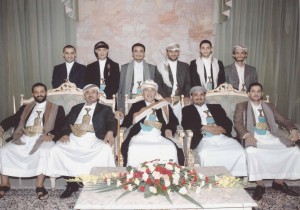Man reacts in one of two ways after God saves him from poverty. Either he remembers his poverty and uses his newly acquired wealth to assist those in need, or forget his past and become overtaken by greed. Abdullah Hussein Al-Ahmar is a prime example of the latter case. He lived a miserable life before the Yemeni Revolution but fate and the Al-Saud family had other plans. The Al-Saud family picked Abdullah Al-Ahmar as their man in Yemen by showering him with money from all directions, and enabled him to control the wealth of Yemen. He is primarily responsible for ruining and weakening Yemen.
After the 1990 Yemeni civil war and unification, Abdullah Al-Ahmar used his vast wealth to control the Yemeni politics and society. He gained control by setting up companies that bore his family name, Al-Ahmar, which lead to the monopolisation of Yemen’s resources. He set up businesses such as restaurants, wedding halls and garages, which outcompeted average Yemenis and multiplied his wealth tremendously.
Banks often complained about the multiplicity of accounts belonging to Al-Ahmar family. This forced the Al-Ahmar family to set up new Banks, whether at home or abroad, through partners such as Bank of Sheba so that the movement of their money avoids detection.
It is a well known fact that Abdullah Al-Ahmar was an extremely selfish man. Not once has he ever contributed towards any charity, but many analysts expected his sons to be different, especially Hamid and Hussein. Many people expected them to provide assistance for those affected by war in Saada excluding Harf Sufyan. Any assistance to Harf Sufyan would be impossible given the historic hostility between the Al-Ahmar family and Harf Sufyan. No assistance was given by Hamid or Hussein and to add salt to the wounds, both rejoiced at the sight of death and destruction in the Saada wars, which was caused by the Popular Army (set up by Hussein Al-Ahmar and funded by Saudi money).
Money gained through corruption won’t last forever. The Al-Ahmar family spend most of their money on mobilising the masses, but never invest on those that suffer and are in dire need. They wish to mobilise the masses so that they can pressurise Ali Abduallah Saleh’s regime into accepting them as a partner in power. One shouldn’t be surprised if Saleh bows down to their demands, especially after Hamid became the opposition leader, which has given their family the opportunity to control both sides of the same coin, the Government and the opposition.





































April 20th, 2011 at 2:49 pm
I enjoyed this short article tremendously. The only fact I have trouble in accepting is when hashimilion says of Sheikh Abdullah that “he lived a miserable life before the Yemeni Revolution but fate and the Al-Saud family had other plans.” Hashimilion must know that the al-Ahmar family had close ties to the Imams, and that Abdullah only suffered for a short while after his father rebelled against them in the 1950s. They have been a wealthy family longer than the Rockefellers.